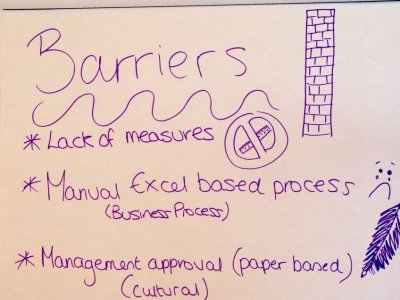
Cambridge Management Sciences Ltd. (CBMSc)
WHY INVEST IN MANAGEMENT TRAINING AND DEVELOPMENT?
A major piece of research by the Chartered Management Institute into the Business Benefits of Management and Leadership Development found:
• 43% of managers rate their own line managers as ineffective or highly ineffective
• In top performing organisations, 80% of managers are rated as effective or highly effective – compared to just 39% in low-performing organisations
• Management and leadership development activities can lead to increases of up to 32% in people performance and 23% in overall organisational performance – but too few employers are doing the right things
• High performing organisations spend on average 36% more on management and leadership development per manager per year than low performing ones (£1,738 compared to £1,275 in 2012).
• Professional qualifications are highly rated by managers, especially in early career stages.
WHY CHOOSE EVIDENCE-BASED MANAGEMENT TRAINING?
We design all our management training courses using an evidence-based approach, to confirm that what you learn works, through research and practical experience. This gives you powerful, proven methods and tools to help you get results.
What does this mean in practice? Here is an example: an excellent resources for finding evidence-based management information is the Science for Work website. They report that there is an 80% chance that a successful training outcome depends on the trainee being motivated to learn. They conclude that there are some practical steps that will help motivate people to get more from their training, and illustrate three:
1 ) Training needs assessment (TNA)
A well-designed and properly conducted TNA can help to:
identify issues
select the right people
highlight the competencies that need to be improved.
Ensure the training addresses real organisational needs, rather than meeting an arbitrary target for the amount of training, or following the latest fad.
2) Communications strategy for training
Create a clear and effective training proposal in advance of arranging the training.
Explain why the training is relevant; how it will be useful and what people can gain from completing it.
Let trainees know you believe they are ready for the course and have what it takes to successfully complete it.
3) Training delivery
Ensure the trainer gives frequent clear feedback.
Don’t teach the most difficult tasks at the beginning of the training – build capability through the training.
Ask employees for feedback on how they feel about the training.
Encourage or make sure someone is there to give them support.
Our open courses offer instructor-led training. Our in-house courses can also be instructor-led and we also provide e-learning and blended options.
Categories
Career & Worklife Guidance
Culture & Transformation
Inspiring People & Coaching
Expertise
Content Design
Sector
Aerospace, Defence & Security
Asset Management
Banking
Business Services
Charities
Education
Engineering & Construction
Entertainment & Media
Financial Services
Government & Public Sector
Healthcare
Industrial Engineering
Insurance
Legal
Manufacturing
Oil & Gas
Pharmaceuticals & Life Sciences
Power & Utilities
Technology
Transport & Logistics
Location
International
UK
London
North East
North West
East Midlands
West Midlands
South East
South West
Ireland
Scotland
Wales
Typical Day Rate
Latest Reviews
Review nowBe the first to leave a review
Shared Expertise by Cambridge Management Sciences Ltd. (CBMSc)
No articles have been published yet




